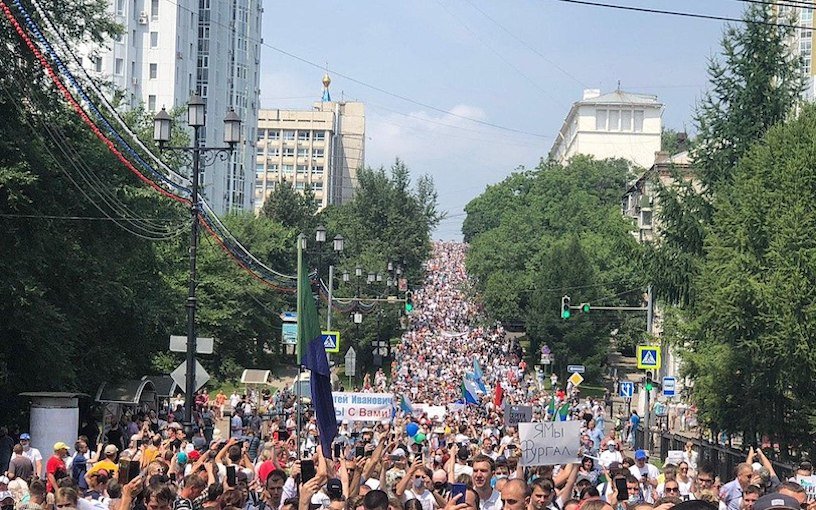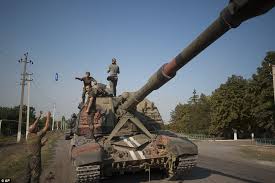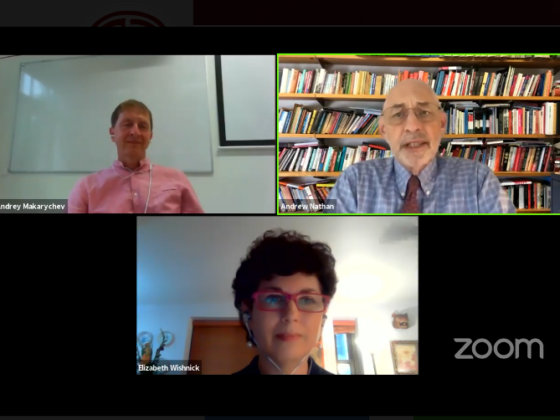In this PONARS Eurasia Podcast, Maria Lipman chats with Denis Volkov (Levada Center) to learn more about public perceptions around current events in Khabarovsk, the “reset” of Putin’s term limit, and the government’s handling of the COVID-19 pandemic.
Listen Here (Blubrry)
Transcript
Calibri;mso-hansi-font-family:Calibri;mso-bidi-font-family:Times;color:black;
mso-bidi-font-style:italic”> Hello everyone, this is Maria Lipman and our PONARS Eurasia Podcast featuring a series of discussions about Russia and Eurasia, about the region’s politics, and about other Russia and Eurasia related topics.
normal”>just under 60 percent to slightly over 20 percent in a matter of less than three years (from Nov 2017 to July 2020). The economic situation is grim and there’s no reason to expect an improvement in conceivable future.
recently released report co-authored by some of Russia’s best political analysts, edited by Kirill Rogov, and published by Liberal Mission Fund is titled “New (Il)legitimacy.” The report’s authors talk about decline of Putin’s support, societal divisions, and rupture of political practices.
mso-bidi-font-family:Times;color:black;mso-bidi-language:AR-SA”>Hello, Denis.
Calibri;mso-hansi-font-family:Calibri;mso-bidi-font-family:Times;color:black;
mso-bidi-language:AR-SA”>Hello.
Calibri;mso-hansi-font-family:Calibri;mso-bidi-font-family:Times;color:black;
mso-bidi-language:AR-SA”>So let us start with Khabarovsk, and let us go back to 2018 when Sergei Furgal was elected governor. He was elected governor, I want to remind, against the Kremlin’s will. He defeated the Kremlin’s candidate. How did that happen, how do you explain his victory?
Calibri;mso-hansi-font-family:Calibri;mso-bidi-font-family:Times;color:black;
mso-bidi-language:AR-SA”>Well, the Khabarovsk region was among several regions which showed this protest voting, and I think – and many experts in Russia think – that it was a result of the aftermath of the pension reform, and also the five-year decline in standards of living. So I think that in Khabarovsk, it coincided with elite conflicts, and people in Khabarovsk wanted Furgal as a governor not from United Russia party, but from the LDPR party. We conducted a couple of focus groups last year discussing the aftermath of these elections, and people explained to me that they were not voting for Furgal, but against a candidate from the United Russia party, Vyacheslav Shport. So it was protest voting, mainly.
Calibri;mso-hansi-font-family:Calibri;mso-bidi-font-family:Times;color:black;
mso-bidi-language:AR-SA”>Right. Do you think there was, at that point in time, this motive of “we’re voting against Moscow, not just against the candidate of United Russia party, the Kremlin’s candidate, but also an anti-Moscow vote?” It seems that such sentiments are characteristic of that far away, Far East region, not just in Khabarovsk, but also in other regions of the Far East. Was there this motivation of voting against Moscow because we, in the Far East, dislike Moscow’s policy vis-a-vis those regions?
Calibri;mso-hansi-font-family:Calibri;mso-bidi-font-family:Times;color:black;
mso-bidi-language:AR-SA”>Yes, exactly, it was partly towards voting against a candidate from Moscow. And it’s not only a characteristic of Khabarovsk. People in many regions in Russia want to have a “native” candidate, a candidate from the region. Not only a candidate, but people in the local government that are local guys, from the local elites, who, as they say, know local problems, who are not sent from Moscow.
Calibri;mso-hansi-font-family:Calibri;mso-bidi-font-family:Times;color:black;
mso-bidi-language:AR-SA”>Right. We will get into how the events in Khabarovsk are perceived in Moscow and elsewhere in the European part of Russia, but I would like to draw attention to the fact that when Russia voted for the constitutional amendments – the vote lasted for a week in late June – the results of the returns of that vote were different in the far East.
Calibri;mso-hansi-font-family:Calibri;mso-bidi-font-family:Times;color:black;
mso-bidi-language:AR-SA”>Well, I would say that ordinary people, they are not following very closely what was going on in the Far East. Shpilkin is a very good specialist, but I would point out that [where support for the amendments was very high, it was not necessarily the result of] fraud as it is, but also of all those nudges, urges, pressure on the voters to make the “right choice” in favor of official candidates or official results. So it was not always that [electoral officials] rewrote the voting results reports, it was also that in many regions, the authorities urged people to make the so called “right choice.” So in this sense, Furgal was not doing this, because maybe he was not interested in doing this.
Calibri;mso-hansi-font-family:Calibri;mso-bidi-font-family:Times;color:black;
mso-bidi-language:AR-SA”>Indeed. Yeah, we will return to that – how expert opinion, expert analysis, relates to what people think, and is it always that what appears very important to experts is also of high importance to the people?
Calibri;mso-hansi-font-family:Calibri;mso-bidi-font-family:Times;color:black;
mso-bidi-language:AR-SA”>Yes, indeed. According to our polls, more than 80 percent are aware of the situation in Khabarovsk, and it struck, I think, people’s imagination, what is going there. And my understanding is that the facts from Khabarovsk, about these protests, about the arrests, they got from television, for sure.
facts from television, they got interested in what is going on there, and then they turned to social networks for opinions, for additional facts. More and more people are doing so. I think, according to our polls, about, actually, one third or even a larger share of the population is already using social networks freely, for additional information.
Calibri;mso-hansi-font-family:Calibri;mso-bidi-font-family:Times;color:black;
mso-bidi-language:AR-SA”>Your recent publication about the perception of events in Khabarovsk is called, “People’s Servant,” if I am correct. Is this how people in your focus groups referred it to Furgal or is it your own wording?
Calibri;mso-hansi-font-family:Calibri;mso-bidi-font-family:Times;color:black;
mso-bidi-language:AR-SA”>No, absolutely, it was [what people said] in focus groups. I would rather, render it as, “people’s champion”. Those outside of Khabarovsk said [in focus groups] that people in Khabarovsk supported [Furgal], and for the majority it meant that he was doing everything right. “People can’t be mistaken” – this, too, is a quote from focus group. In [our focus group discussions] Furgal was called “people’s champion”, “people’s servant”, they said he was a good guy, people from Khabarovsk loved him. I mean, it’s what we got from people, it‘s not my invention.
Calibri;mso-hansi-font-family:Calibri;mso-bidi-font-family:Times;color:black;
mso-bidi-language:AR-SA”>Right. And what about the charges against Furgal? Does this mean that people are not interested, or people don’t care? I mean, people in your focus groups. They, apparently, are aware of very serious charges brought against Furgal – how do people take that?
Calibri;mso-hansi-font-family:Calibri;mso-bidi-font-family:Times;color:black;
mso-bidi-language:AR-SA”>Well, yes, everyone knows about it, but they say – well, you know, everything happened in the nineties. Let us look at other politicians, let us closely look at the facts in their biographies. For sure, many of them will have something similar to Furgal. So, obviously, for many people it’s more important what he was doing, and that people in Khabarovsk liked him. It does not matter much what skeletons in the closet he has.
Calibri;mso-hansi-font-family:Calibri;mso-bidi-font-family:Times;color:black;
mso-bidi-language:AR-SA”>Right. So, you’re telling us that there is real solidarity, verbal solidarity, with Khabarovsk. Events in support of Khabarovsk protesters have been very small compared to Khabarovsk itself. There were barely hundreds of people in the regions in the Far East, and, I think, rather, dozens elsewhere in Russia. Expressions of public solidarity were very easily dissolved and suppressed by local authorities. Is that correct?
Calibri;mso-hansi-font-family:Calibri;mso-bidi-font-family:Times;color:black;
mso-bidi-language:AR-SA”>Absolutely. We see that although they are sympathetic with Khabarovsk and its people, quite few are ready to express solidarity in the streets. And I think that people, first of all, see it as a rather local event. And also, I think even maybe more importantly, Calibri;mso-hansi-font-family:Calibri;mso-bidi-font-family:Times;color:black;
mso-bidi-language:AR-SA”>So let us now get to more general perceptions, from what people think about Khabarovsk and what goes on there to the developments nationwide and things that are now experienced by most Russians. Let us start with the perception of the COVID pandemic. Some analysts already say that people have already forgotten about it – well, of course, quote-unquote “forgotten.” Of course they remember, but they don’t care too much anymore, and they basically think they’ve already had the pandemic past them. Is this the perception that you come across in your focus groups?
Calibri;mso-hansi-font-family:Calibri;mso-bidi-font-family:Times;color:black;
mso-bidi-language:AR-SA”>Well, I think yes and no, not only in focus groups, but in the surveys as well. For sure, there are differences between, for example, Moscow, which was the city that was struck most of all by the pandemic. And, I think, in Moscow, people still keep recollections about it. What are [the recollections]? I think the most important is this closure of many organizations, many shops and restaurants and so on. And this part of businesses suffered, really suffered, during this shutdown, and they’re not recovered yet. Some are shut down permanently now because they are out of business. What is also important is that people lost money, through cuts in salaries, some just lost their jobs, not only in Moscow, but across the country.
Calibri;mso-hansi-font-family:Calibri;mso-bidi-font-family:Times;color:black;
mso-bidi-language:AR-SA”>I see. So let us now get to the topic of the amendments, and of course, the zeroing amendment. If we look at what analysts are saying, and, in particular, in the report that I cited earlier, we see wording such as “egregious rigging,” “outrageous violations of electoral procedures,” and “unprecedented anomalies,'” with the implication being of course, that the anomalies, are, in fact, fraud.
Calibri;mso-hansi-font-family:Calibri;mso-bidi-font-family:Times;color:black;
mso-bidi-language:AR-SA”>Actually, here we can talk about what you have already mentioned, this difference between the expert, and the public opinion. Because for many people, this vote, well, it was not a very important event. Part of the population – somewhat less than one half of the population, about 40 percent – they were ready to go and vote, [even prior to the government mobilization campaign].
Calibri;mso-hansi-font-family:Calibri;mso-bidi-font-family:Times;color:black;
mso-bidi-language:AR-SA”>Okay. So, we’re not Chile, and indeed, nothing like that happened. Do you think that in the aftermath of the vote for the amendments, people who had been against those amendments, and first and foremost, I guess, against the zeroing amendment that now enables Putin to reign as president for an indefinite time – do you think there is broad or deep bitterness? Do people talk about it? Do they feel really disappointed about what happened?
Calibri;mso-hansi-font-family:Calibri;mso-bidi-font-family:Times;color:black;
mso-bidi-language:AR-SA”>Well, I’m not sure we felt – me and my colleagues – we felt this bitterness very much. It’s not very visible. But what we see is the ratings of this “first guy,” Putin, going down, this process still goes on. His personal rating is still deteriorating, his personal appeal. By this personal rating I mean the level of trust, as a rating for the future, because it coincides with the numbers that we get about the share of people who really see him as a candidate for next presidential election. So this process goes on. Another dynamic – when we ask about the approval of the government, of the president, of the overall situation, this process has stabilized. For a couple of months already, it has not been deteriorating further.
Calibri;mso-hansi-font-family:Calibri;mso-bidi-font-family:Times;color:black;
mso-bidi-language:AR-SA”>Indeed. And Putin’s approval rating is low by his standards, but still it remains at a level of about 60 percent, I think, over the past months – according to your polls, at least.
Calibri;mso-hansi-font-family:Calibri;mso-bidi-font-family:Times;color:black;
mso-bidi-language:AR-SA”>Well, I think, not yet. What I’m saying is that we register similar levels of the approval ratings, of the assessment of the general situation, and so on. I’m speaking about the beginning of the economic crisis in early spring. According to our estimates, the public perception now is very much like that at the time of two previous economic crises. The crises of 2008-9 and the end of 2014. However, what’s different now is that, at the beginning of those crises, the authorities’ ratings were at their maximums, at their peaks. And then, during the next several years of declining economy, the authorities felt themselves rather comfortable because the default ratings were so high.
Calibri;mso-hansi-font-family:Calibri;mso-bidi-font-family:Times;color:black;
mso-bidi-language:AR-SA”>Interesting, you’re saying that Putin may be not even in the mood to stay in the presidential office come 2024 or come 2030. Actually, one of the analysts, Nikolai Petrov, in the report that I keep quoting, forecast exactly this – that Putin will step down in 2024. And he is the only one, I think, who is intellectually courageous enough to forecast such a dramatic development.
Calibri;mso-hansi-font-family:Calibri;mso-bidi-font-family:Times;color:black;
mso-bidi-language:AR-SA”> Well, not really. Of course something is changing, and we see the perception of Putin changing, but this is true of the largest cities. In smaller places, quite often it’s the same as usual: people attempt to differentiate between Putin and United Russia, Putin and bureaucrats, so Putin is still okay. In larger cities such as Moscow, that’s not exactly the case. There’s more discontent with Putin personally, but still I would say, in the focus groups that we saw, the situation is still stable. Stable enough, I would say.
percent said right track and 40 percent said wrong track. It may be interesting to compare these numbers to similar findings, similar results, in the US surveys. In the United States only 26 percent say these days that the country is on the right track, while 74 percent say that the country is on the wrong track – of course, it varies somewhat poll to poll. But I think it’s interesting that in the United States three times more people believe their country is on the wrong track than those who think it’s on the right track. Just to give an idea of how different these perceptions are in our two countries.
Calibri;mso-hansi-font-family:Calibri;mso-bidi-font-family:Times;color:black;
mso-bidi-language:AR-SA”>Well, usually, for many years in our surveys, we saw that the youngest generation was the most loyal to the authorities, to Putin personally. And now this is changing, and this change emerged about only a year ago or so. So we must still monitor whether it will stay as it is, because it’s a very, very new situation.
Calibri;mso-hansi-font-family:Calibri;mso-bidi-font-family:Times;color:black;
mso-bidi-language:AR-SA”>Indeed. This is an appropriate ending for our conversation. Thank you, Denis, and let’s wait for how things will change.
Calibri;mso-hansi-font-family:Calibri;mso-bidi-font-family:Times;color:black;
mso-bidi-language:AR-SA”>Thank you.
Homepage image credit.











